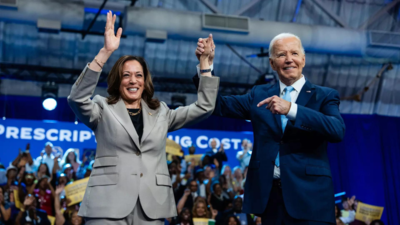
Kamala Harris, a one-time hopeful who entered the race as Donald Trump’s final challenger to the Republican front-runner in the US election, was narrowly defeated even by veteran party leaders who questioned the future direction of the Democratic Party.
Harris’ defeat has sparked criticism and anger among Democrats, with some blaming his campaign strategy, while others pointed the finger at US President Joe Biden.
Biden, 81, announced his re-election bid in April 2023 amid widespread doubts about his health and fitness. However, his confidence remained steadfast. “I deserve to serve,” he said, determined to prove he was the only Democrat who could defeat Trump.
But an acrimonious debate in June called his mental acuity into question, eventually prompting him to pull out of the race in July, citing the interests of the party and the nation.
For some, Biden’s exit came too late. A prominent Democratic donor expressed his displeasure, telling news agency Reuters, “Joe Biden lasted as long as he did? He shouldn’t have hid his (health) and left much sooner.”
“The party lied to the American people about the president’s cognitive health and fitness, and then didn’t hold a primary to replace him,” said Bill Ackman, a longtime Democratic donor and hedge fund manager.
Internal criticism of Biden’s inner circle emerged as party members went after Harris, with one official bemoaning the “misbehavior” of Biden’s advisers. “They never told her,” they reportedly said.
While Harris stepped into the void as Biden’s loyal successor, his alignment with his policies may have proven to be his weak point. A former campaign aide said Harris’ loyalty to Biden put him at odds with potential voters looking for a new direction. Her comments on ABC’s “The View” — that she wouldn’t do anything different than Biden — added fuel to critics who felt she failed to present herself as an agent of change.
“The party needed someone willing to take a bold, independent stand,” the aide was quoted as saying by Reuters, pointing to global examples such as Canadian Prime Minister Justin Trudeau, who recalibrated his immigration policies in response to right-wing pressure.
The supporters Harris had hoped would rally behind him, particularly young, diverse voters passionate about climate action and progressive ideals, and women concerned about abortion rights, did not turn out in the expected numbers. Trump drew support in once-blue suburbs, as well as Hispanic voters and in states like Georgia and North Carolina, where Democrats believed they could compete. Some Democratic National Committee officials reported receiving an outburst of discontent from party members on election night. , citing disappointment in a campaign that they felt offered false hope. “They felt lied to,” said one DNC official, adding that many party members had expected a close race.
The defeat marks Trump’s second crushing defeat for Democrats in recent years, reviving memories of Hillary Clinton’s 2016 campaign. Trump, despite facing legal problems and proposing controversial policies, including across-the-board tariffs that economists warn could harm American consumers, still managed to attract undecided voters. His campaign effectively took on concerns about immigration, promising mass deportations, which resonated in ways inconsistent with Harris’ inclusive platform.
Divisive issues such as Biden and Harris’ stance on US support for Israel during the Gaza crisis, which split progressive Democrats from the party’s mainstream, added to the obstacles.
On election night, crowds gathered outside Harris’ alma mater, Howard University, anticipating a lengthy counting process. But by Wednesday afternoon, the results were clear. Harris arrived at Howard’s to give a brief, solemn concession speech, thanking Biden and promising, “When I accept this election, I will not accept the fighting that fueled this campaign.”
(including agency inputs)